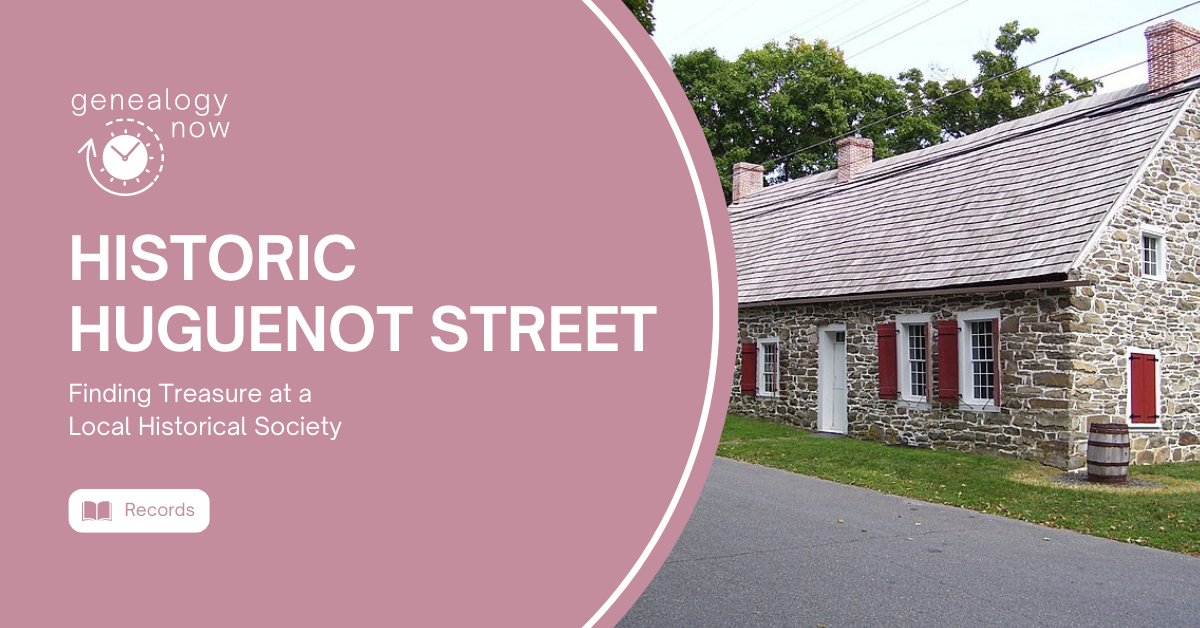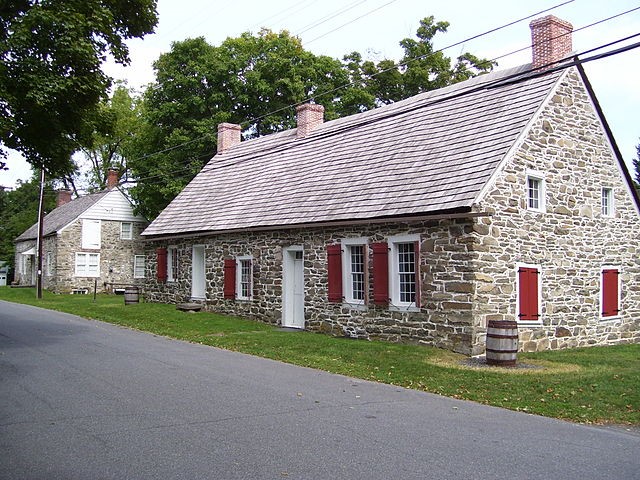
I have recently been researching the Dunn family of New Paltz, Ulster County, New York. My research had identified a group of five Dunn men who I believed to be brothers, along with a potential father for the group. However, I hadn’t been able to locate records online that would tie the men to one another as family. My next step was to make a list of libraries and historical societies in the area and reach out to them via email, because I don’t live in the area.
One promising repository I identified was Historic Huguenot Street in New Paltz. In addition to historic homes, Historic Huguenot Street has “an excellent archival collection, thanks to the forward-thinking nature of generations before us and the generosity of descendants and others interested in history.”[1]

Historic Huguenot Street has created some valuable finding aids for learning what is available in their archives. In their Personal and Familiy Papers (1672-1998) collection, I was excited to see a listing for “Dunn Family Papers (1791-1967), which includes “wills, deeds, inventories, receipts, agreements, letters, photographs, albums, etc.” Their Artificial Collections Finding Aid includes a link to a list of 150 wills and other probate records. I was curious about the wills for Margaret Dunn (1789) and Mary Dunn (1790).
I made a detailed list of these and a few other items that interested me and contacted the historical society. A researcher got back to me within a few days, and let me know when she would be able to look at the records. Just a couple of days after the day appointed for the research, I received an email from the researcher with images of about forty documents she thought would be of interest. The wills of Margaret and Mary, along with some additional loose probate records, were the key documents I needed to connect the Dunn men I had been studying as brothers and to identify their parents, Thomas and Mary Dunn. The mother Mary Dunn’s will stated she was the widow of Thomas Dunn. I learned that the couple had four daughters, including Margaret Dunn, who passed away sometime between the time she wrote her will in 1789 and when her mother Mary wrote her will in 1790. Although the brothers weren’t mentioned by name in the wills, three of the five men who I had identified as possible brothers were witnesses to the wills, providing great evidence for a familial relationship. Other records provided additional clues that helped tie the family together.
Because Mary and Margaret’s wills included bequeathments of personal items (clothing, etc.) only, they were never filed with the county. I’m so thankful that a family member held onto the documents and passed them down to a generous descendant who was interested in preserving history and subsequently donated them to the historical society. These records were like gold for my case. I’m also so thankful for the generosity of Historic Huguenot Street, offering lookup services for people like me who don’t live in the area.
Tips for Finding Treasure in Local Historical Societies
Have you considered local libraries and historical societies as a source for your research? Here are a few tips that will help you have success:
- Focus on a specific research question to narrow the request. Don’t ask someone to “find all the information about the family of John Smith.”
- Look at available online catalogs, inventories, and finding aids and identify items that you think might help answer your question.
- When you have assembled your query, reach out to the historical society and introduce yourself. Before sending the query, ask what the procedure is for research at the historical society. Are onsite researchers available to fulfill research requests? Do you need to hire a local researcher to visit the historical society and perform the research? What fees are involved? Who should be your point of contact at the historical society?
- Once you have established a point of contact and learned the research procedures, you are ready to submit your detailed research query.
- After you receive the results of your search, be mindful of copyright and related issues. Historic Huguenot Street specifically requested that the record images I received not be published without their permission. Be sure to find out the expectations so you can maintain a good relationship with the society.
- Most importantly, always be gracious. Practice patience and always thank the historians for their time and information. If the library or historical society does not accept payment for their lookup services, consider making a donation to show your gratitude. Many societies rely on donations to support their operations and educational programs.
Local libraries and historical societies can be a treasure trove for genealogists. When we limit ourselves to online repositories, we could be missing out on the key documents that will help break down our brick walls. Be sure to add historical societies to your future research plans!
- “Historic Huguenot Street,” New York Heritage Digital Collections (https://nyheritage.org/organizations/historic-huguenot-street : accessed 8 January 2022).
